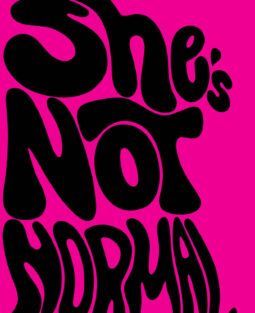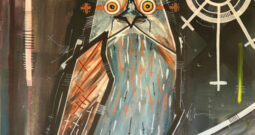from the editor's desk

Review of ‘She’s Not Normal’ by Koraly Dimitriadis
Dimitriadis, Koraly. She’s Not Normal. Warriewood: Outside the Box Press, 2024. RRP: $28.95, 200pp, ISBN: 9780645775204.
Gemma White
Koraly Dimitriadis, perhaps more than most poets, comes with a host of assumptions or ‘labels’—feminist, Cypriot-Australian writer, ‘a hysterical woman’: according to the poet herself, people seem to like putting her ‘in a box’ (181–182). If that is the case, then She’s Not Normal is a banshee scream of liberation and a declaration of all that Dimitriadis knows to be true, even when that truth-telling leads to uncomfortable places. It is a reclaiming of the facts from the poet’s point of view.
Usually, I would not conflate the narrator of a book with the author, but, in this case, it is hard not to, as the preface gives some biographical context to the book and strongly links the poems and the poet. The poems themselves jump off the page, perhaps looking for a nearby stage from which they can captivate an audience with their effervescence. For this is not page poetry. There is a strong sense of rhythm and dynamism in She’s Not Normal, as if the poems are pulsing with a lifeblood of their own. Similarly, the poems do not follow conventions. They refuse to be tied down and often use atypical spellings for emotional effect, as in—‘Whyyyyyyy? Why can’t she be normal?’ (2), and bold capitals for a similar purpose ‘I’m STILL IN A BOX!’ (12) The opening of the first poem of the collection sets the tone, with persistent questions giving a sense of what it’s like for the narrator of the poem to live with the repeated accusation of not being normal:
Why isn’t she normal?
Why can’t she be normal?
Why can’t she say normal things?
She’s not normal
Why can’t she be normal? (2)
The theme of not fitting in with the mainstream or with peers is continued in the poem ‘I am angry because’, where the narrator reports ‘that all the people picking on me / at primary school were Aussie boys / & wog boys and wog girls / (everyone, basically)’ (8). The poem ends with the thought that ‘I’m angry because I don’t belong anywhere’, meaning the narrator feels they don’t belong in Cyprus or in Australia either. This poem seems quite simple, but it hints at an emotional truth which likely mirrors the experience of many people from migrant families.
With the dynamism and passion expressed in many of these poems it can be easy to overlook the more subtle tones that emerge when the narrator allows herself to be vulnerable. This occurs particularly around ideas of writing and of being a writer. The narrator states ‘everyone, including my family, / doesn’t want me to write’ and refers to her writing as ‘the shame that is my art’ (33, 38). And yet, the reader also gets to experience her compulsion to create art, to kick against the pricks, because, Dimitriadis writes, ‘I’m not some white middle-class guy / who has been educated in literature […] I’m a divorced single mum / from a working-class sexist, patriarchal background’ (33). She adds: ‘if we all don’t rise up and speak […] humanity will have to / foot the silence / instead’ (40). It is this dichotomy of feeling compelled towards self-expression but then regretting the vulnerability involved that brings forth such human tensions in the collection.
The sexually explicit material in this book can’t be ignored, and the purpose of its inclusion should be examined. Is it supposed to turn the reader on? Are the poems more diary entries for the speaker? Or are they trying to express something to the absent person to whom they are addressed? Perhaps there is something deeper going on altogether. A representative poem is ‘I psychotically love you’, and it includes the lines:
And all that I am certain of is
The warmth of your tongue
Should exist on my clit, always
You should push down on my thighs
Persist while I resist
Licking it
Fast, fast, fast
Slowing, for eternity (107)
This is really a love poem, but one that commits to paper a distilled and crystalised version of female desire—the kind of desire that is still a revolutionary act in these times. The male gaze predominates across culture. So, with her sexually explicit poems, Dimitriadis offers another viewpoint on sexual interactions. Another potential freedom, if you like; another way out of the box.
Dimitriadis doesn’t just seek inspiration from her own life, she also responds to current events in the media (current at the time of writing) that affect her. In ‘Louie, Louie, Louie’, she laments the sexual allegations made against Louis CK, stating ‘you broke my heart today / Your comedy was such an ode to honesty / It inspired me in so many ways’ (61). This is one of those uncomfortable places that Dimitriadis takes her reader: clearly the narrator is grieving a creative mentor who has been discredited, and she mourns that lost artistic inspiration. It’s also clear that the poem does not excuse or condone Louis CK’s actions. In ‘Thank-you, feminist Gillard’, the poet writes of the consequences of policy decisions that result in a ‘Centrelink queue [which] is weaving / around the bend this afternoon’. She decries how parenting payments are being cut, putting further pressure on single mums (63–4). In this poem, Dimitriadis gives written voice to a typically underrepresented part of the community, ‘all / the while trying my hardest to produce art encouraging / repressed women to / break free’ (65). That sentence could be the ethos of the whole book—the banshee scream of the repressed woman rises in this work, and it’s not taking no for an answer.
Gemma White is a poet living in Melbourne/Naarm, Australia. She has had two poetry collections published by Interactive Press; Furniture is Disappearing and Oh My Rapture. She shares her knowledge of poetry at www.gemmawhite.com.au, where she offers a free 5-day email poetry course.





